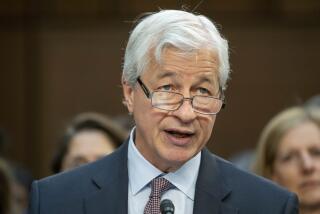JPMorgan Chase reports profit of $3.33 billion in first quarter
- Share via
Reporting from New York — JPMorgan Chase & Co. continued to show strong profit in the first quarter of the year thanks to its investment bank and an improving situation for ordinary borrowers.
The New York-based banking giant announced on Wednesday morning that it had profit of $3.33 billion in the first quarter of 2010, up slightly from its profit last quarter, and up significantly from its profit a year earlier during the financial crisis. The bank’s total revenue of $28.2 billion beat the expectations of analysts.
The single largest source of profit was the trading and underwriting of bonds at JPMorgan’s investment bank. Profit at the investment bank was $2.47 billion, up from what were already good quarters last year.
Profit was much smaller in JPMorgan’s commercial banking operations, which deal with retail borrowers and lenders. But the picture here appears to be improving in a hopeful sign for the American economy. In one indicator, 30-day credit card delinquencies were down from last quarter and from a year earlier.
“While the economy still faces challenges, there have been clear and broad-based improvements in underlying trends,” JPMorgan’s chief executive, Jamie Dimon, said in a statement. “We believe these improvements will continue and are hopeful they will gather momentum.”
JPMorgan is the first major bank to report its earnings this quarter, and the returns were looked to by investors for a sign of things moving forward.
The one continuing dark spot in the earnings report was the mortgage operations. JPMorgan has been particularly hurt by the home loans it took on when it purchased Washington Mutual. In the first quarter, JPMorgan readied itself for $1.2 billion in losses from that portfolio.
JPMorgan was among the most successful banks in weathering the financial crisis. But Dimon has recently has received negative attention for his criticism of the financial reforms proposed by the Obama administration and Congress.
In the release Wednesday morning, Dimon emphasized the bank’s support of the administration’s goal of helping ordinary borrowers.
For the bank as a whole, though, the big gain is coming not from the retail bank but from the firm’s elite investing activities, which provided over two-thirds of the bank’s profit. Bond traders, the most profitable part of JPMorgan, have been aided by the low interest rates offered by the Federal Reserve.
In a move that could prove controversial, the bank increased the amount it was setting aside for compensation and bonuses from last quarter. In the last quarter of 2009, JPMorgan decreased compensation expenses to $5.1 billion for the quarter in response to the public anger over bank bonuses. This quarter, the figure went back up to $7.3 billion in the first quarter.
More to Read
Inside the business of entertainment
The Wide Shot brings you news, analysis and insights on everything from streaming wars to production — and what it all means for the future.
You may occasionally receive promotional content from the Los Angeles Times.










